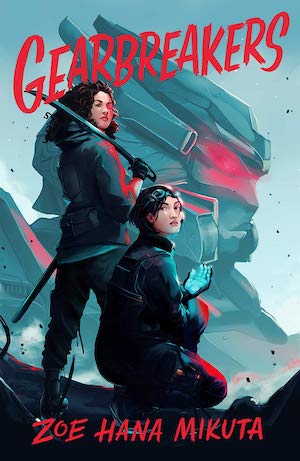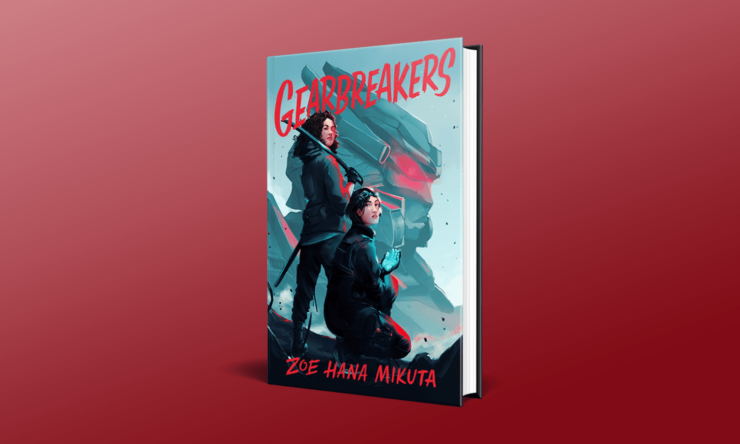In a brutal world falling to the tyrannical rule of a militarized state power, two furious girls risk everything to fight back. When their very different paths cross, they may find in each other the one thing they didn’t know they’ve been missing. Zoe Hana Mikuta infuses an intense sci-fi adventure with heart, hard choices, and found family in her debut novel Gearbreakers.
Godolia uses enormous piloted robots, weapons big enough to crush a village with a few steps, to keep what they deem “peace.” Think Pacific Rim, but instead of controlling the mechas with something as interpersonal as drifting, Godolia’s pilots are cybernetically enhanced to bind with the Windups. This means they can’t feel pain unless they’re piloting, and they’re essentially weapons of the state. Gearbreakers alternates between two POVs. Eris Shindanai is a Gearbreaker, a member of the anti-Godolia rebellion whose life revolves around doing whatever she can to take down as many Windups as possible. The leader of her own close-knit crew, she’s powerful and nearly fearless, but when she risks her life for that crew, she ends up captured by Godolia. Deep in their clutches, she assumes Sona Steelcrest will be her downfall. But Sona has a secret. She lost everything to Godolia as a child. So when they chose her to be a pilot, she decided she’d be the best pilot possible…to infiltrate their program and bring down Godolia from within, no matter the cost. The unlikely pair must learn to trust each other, because united, they might just be exactly what the Gearbreakers were missing to finally overthrow Godolia. But, understandably, not every Gearbreaker is as ready to trust the enemy as Eris.
Mikuta strikes an expert balance between the brutal, high-octane premise and the community her characters find within one other. This could have been a lighter, campier story, what with giant robots and found family, but it takes itself seriously, and it’s highly effective. This is an intense read, full of devastating violence and extreme terror, even as Mikuta cuts it with throughlines of humor and hope. Gearbreakers leans into the very real horror of a violent, militarized state that’s decided any sort of dissent is a capital offense, a state that will murder every member of a village over perceived slights. It wrests with the many-layered trauma of war, especially for children who were never allowed to be children. These characters must fight against deeply insidious forces, forces that have the power not only to mercilessly murder, but to burrow into their very brains and bodies. They can tear away a person’s agency, and make a people worship their annihilators. Sona, Eris, and their friends must make impossible choices, and navigate their unimaginable grief and weight. They must figure out how to survive unsurvivable state violence, and to hold onto hope in the face of extreme hopelessness. They find it in each other.
Buy the Book


Gearbreakers
This is a novel of masterful, intricate character development all around, but especially with Sona. Can a character be morally gray when an evil force has given her absolutely no choice? How can someone learn to trust in a world built on betrayal and impossible odds?
The found family of Gearbreakers is beautifully evoked, especially because they’re no pure-hearted heroes. Mikuta emphasizes their complexity—they’re not easy foils to the Windup pilots and their legion of specialized Valkyries. They’ve been pushed to ruthless extremes just to survive the violent state power. The clearest, most compelling example is between Eris and her sister Jenny: a vicious, deeply believable complicated dynamic.
At its core, this is a book about the monstrous unfairness of war, the insidious devastation of a violent state superpower. Godolia has its worshippers; Sona’s own parents were what’s known as mechvespers. Despite all evidence, they’ll believe that the Windups are their Gods, right until they’re crushed underfoot. The book never loses sight of how young these girls are, how violent their lives have to be. They didn’t choose to be killers, but their alternative is losing themselves, body or soul, to Godolia.
The sapphic romance at the heart of Gearbreakers is gorgeously rendered, developing alongside the thickening plot. Sona is a lesbian and Eris is queer/pan/bi. As they fall for each other in a sweet slow burn, Mikuta truly leans into the emotional complexity of that attraction, and how each girl balances it with their own past. Eris’s justified doubt. Sona’s self-loathing and shame, the way she’s never had anything good to work toward before. They see each other, more clearly than anyone else ever has. Healing is not straightforward for either of them, but they move each other toward it. There’s banter and brightness here, even when the stakes couldn’t be higher. It’s tender and powerful: an intimacy founded on wanting to protect each other. I fell thoroughly in love with both characters, and the deeply earned dynamic that blossoms between them. Also, in a world that’s not named like ours, the lead characters are understood to be of Korean and biracial Korean descent through references that ground the novel in cultural anchor points, and it’s excellent to read these Korean sapphics fall in love while taking down giant mecha-deities.
This is a reclamation of the self in a world ruled by forces far beyond the self. Ultimately, Gearbreakers is about who we belong to, who we choose to be, and how we choose to fight. To fight a system even though you are afraid, even though you are not sure how to rebuild. The complexity of vengeance, the need for something to run toward instead of only away. What it means to be human, to love, and to trust.
Delivered through propulsive prose and immersive worldbuilding, Gearbreakers is twisty, ominous, and high-octane. Expect a few big surprises—readers reaching the final pages will be grateful there’s a sequel on the way. It’s glitteringly cinematic, and I was excited to find that movie rights have already been set. I think it’s going to translate spectacularly on-screen. It’s action packed with mechas and violence, but it’s also super fun! It brims with badass rebel girls, tattoos, slow dancing, firelight, and found family with all the intimacy and heartache that comes with family. Blood-soaked and big-hearted, this is one you won’t want to miss.
Gearbreakers publishes June 29th with Feiwel & Friends.
Read an excerpt here.
Maya Gittelman is a queer Pilipinx-Jewish diaspora writer and poet. Their cultural criticism has been published on The Body is Not An Apology and The Dot and Line. Formerly the events and special projects manager at a Manhattan branch of Barnes & Noble, she now works in independent publishing, and is currently at work on a novel.










